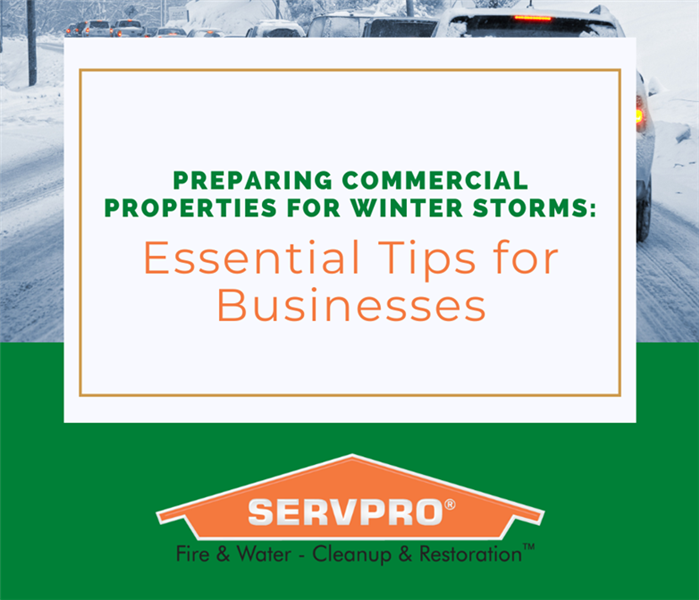Preparing Commercial Properties for Winter Storms: Essential Tips for Businesses
11/2/2024 (Permalink)
Winter storms can be harsh, especially for business owners whose properties are vulnerable to extreme weather. Snow, ice, high winds, and freezing temperatures can cause extensive damage, leading to costly repairs, downtime, and safety risks for both employees and customers. Taking preventive steps before winter arrives can save you from dealing with severe storm damage. Here are key tips for safeguarding your commercial property, with a focus on securing roofs, preventing water damage, and maintaining backup power systems.
1. Secure Your Roof: Shield Your Building from Snow and Ice
The roof is your property’s primary defense against winter weather, but heavy snow, ice dams, and freezing rain can damage it if it isn’t properly maintained. Here’s how to protect your roof:
- Inspect and Repair: Have a professional inspect your roof before winter to check for loose shingles, damaged flashing, and other vulnerabilities. Repairing these issues early helps prevent leaks and structural damage from snow and ice buildup.
- Clear Gutters and Downspouts: Blocked gutters can lead to ice dams, which can back up water into the building and cause leaks. Make sure gutters are clear and that downspouts direct water away from your foundation.
- Install Roof De-Icing Solutions: De-icing cables can prevent ice dams by keeping roof edges warm, allowing melted snow to flow into the gutters without refreezing.
- Snow Removal Plan: If your area sees heavy snowfall, establish a snow removal plan to avoid roof strain and potential collapse. Hire professionals to safely remove excess snow from your roof.
2. Prevent Water Damage: Combat Ice, Snow, and Flooding Risks
Winter storms bring not only cold air but also serious water risks. Melting snow, ice, and freezing rain can cause water intrusion and flooding. Here’s how to minimize water damage:
- Seal Windows and Doors: Check for gaps or cracks where cold air and moisture can enter. Use caulk or weatherstripping to keep your property warm and dry.
- Insulate Pipes: Frozen pipes can burst and cause major water damage. Insulate exposed pipes in vulnerable areas and keep the building’s heat on at a moderate level if it will be closed during a storm.
- Ensure Proper Drainage: Keep drains, gutters, and downspouts clear so water can flow away from your property. If your building is prone to flooding, consider installing a sump pump.
- Check for Roof Leaks: After heavy snowfall or ice buildup, inspect your roof for leaks. Addressing a small leak promptly can prevent major water damage.
3. Backup Power Systems: Keep Your Business Operational
Winter storms often lead to power outages, which can halt business operations. Investing in reliable backup power is essential:
- Install Backup Generators: A commercial generator can keep critical systems like heating, lighting, and security online. Select a generator that fits your business’s needs and service it regularly to ensure it’s ready for emergencies.
- Use Uninterruptible Power Supplies (UPS): For sensitive equipment like servers and computers, a UPS provides short-term power and protects against sudden outages or surges.
- Regular Testing: Schedule regular tests and maintenance for your backup power systems to ensure they’ll work when needed.
- Create a Contingency Plan: Develop an emergency plan for power outages, detailing steps for contacting power providers, notifying employees, and safeguarding data.
4. Winterize Your HVAC System
Your HVAC system works hard in winter to keep your building warm and safe. Prepare it with these steps:
- Schedule a Tune-Up: Have a professional inspect the system before winter. Replace filters, check for leaks, and ensure heating components are functioning properly.
- Check for Carbon Monoxide Leaks: Fuel-burning heating systems can produce carbon monoxide if not properly vented. Install carbon monoxide detectors and have your system inspected for leaks.
- Maintain Ventilation: Proper ventilation ensures fresh air circulation and prevents moisture buildup, which can lead to mold.
5. Develop an Emergency Storm Plan
Beyond property prep, a solid emergency plan is essential for protecting employees and maintaining operations:
- Communication Plan: Ensure employees know how to receive updates about closures, outages, and safety protocols. Assign roles to key staff members for managing the storm response.
- Emergency Supplies: Stock essential items like flashlights, batteries, first-aid kits, blankets, and non-perishable food to keep employees safe if an emergency arises.
- Regular Maintenance Schedule: Set a year-round maintenance schedule to keep your property in peak condition, including roof checks, HVAC upkeep, and testing backup power systems.
Winter storms don’t have to catch your business off guard. By securing your roof, preventing water damage, maintaining backup power, and winterizing your HVAC system, you’ll protect your property and ensure smoother business operations through the cold months. Investing time in winter preparation now can save you from significant repair costs and downtime.
If you’re unsure where to start, a professional restoration and property maintenance team can assess your building’s vulnerabilities and help you take proactive steps. Don’t wait—start preparing your commercial property for winter today!
As a trusted leader in the restoration industry, SERVPRO of Natick, Milford, and Milford has the advanced training and equipment to restore your property. Call us at (774) 290-4300.




 24/7 Emergency Service
24/7 Emergency Service
